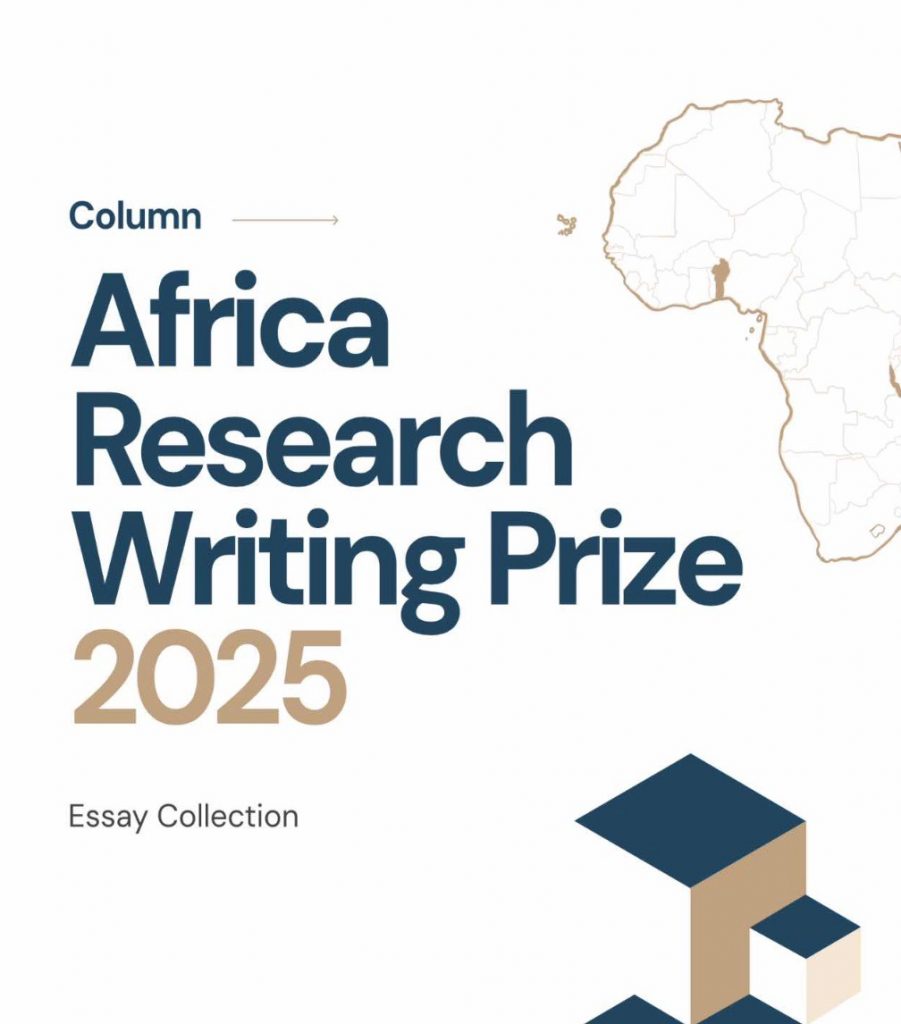Column 2025 Africa Research Writing Prize
Highlight a local problem, back it up with data, and propose a real solution. Submissions now closed.

About the Prize
Column is launching the first Africa Research Writing Prize. The goal is to highlight smart ideas from across the continent—written clearly, backed by evidence, and focused on real change.
This is for everyday thinkers, not just academics. We’re looking for writing that informs, connects, and explains.
Download the promotional graphics here.
Who can enter (eligibility)
- You must be based in an African country
- Anyone can enter—students, professionals, researchers, writers, activists, or journalists
- No academic background required
What to submit
Send us a simply worded essay (up to 1,500 words) that:
- Explains a real problem in your country, city, or community using at least three recent data points from credible sources
- Proposes realistic solutions using at least three data points to support your suggestions
- Connects the problem and solution(s) clearly—how could it work in your context? What needs to change for it to succeed?
- Uses simple, clear English that anyone can understand
You don’t need big problems or global issues. You don’t need big words, either. What matters is your thinking, the strength of your data, and how well you explain your ideas.
Prizes and perks
- 2 winners will each get $150
- 3 runners-up will be named as highly commended
- All winning essays will be lightly edited and published in a special report on our website
How to enter
- Share your essay as a public Google Doc
- Make sure the link is set so that anyone with the link can view.
- If we can’t open your Google Doc, your entry won’t be accepted
- Fill in the form linked below to submit your entry
- Deadline: July 18, 2025
- Winners announced: By July 25, 2025

How we'll judge
We’ll be looking at:
- How relevant and clearly defined the problem is
- How recent and trustworthy your data is
- Whether the solution fits your context
- How well the essay is written and structured
- How clear and accessible the writing is
Essays that use AI blindly or copy content from elsewhere will be disqualified.

Sponsor a prize slot
Help us support more great writing. Sponsor a prize slot and get listed in our report, on our site, and possibly on the judging panel.
Supporter – $200
Fund one prize. Name and photo listed in the final volume.
3 available – 2 already taken
Champion – $500
Fund two prizes. Name, photo, and logo in the final volume and on our website.
Only 2 available
Judge – $1,000
Fund two prizes and support editing costs. Get a seat on the judging panel, a full sponsor profile, and a LinkedIn spotlight.
Only 2 available
To become a sponsor (public or anonymous), please email team@columncontent.com with the subject: “Sponsor – Africa Research Writing Prize”.

Frequently asked questions (FAQs)
Anyone aged 18 or older who is currently based in an African country.
No. The prize is open to all—students, professionals, freelancers, entrepreneurs, activists, etc.
Yes, as long as the problem is specific to your country and supported by at least three local data points from credible sources.
Published reports from NGOs, government agencies, newspapers, journals, or research organizations. Internal or unpublished data will not be accepted.
Yes. The three solution data points (minimum) can be from any country, but you must clearly explain how the solution fits your local context.
No. Only one entry per person is allowed.
Write your essay in a Google Doc, set the link to “Anyone with the link can view,” and submit the link through the official Google Form.
Sure, but please transfer your essay to Google Docs before submitting the link, or your entry will be disqualified. Make sure the link works.
Yes. The winners and highly commended entries will be lightly edited and published in the Africa Research Writing Prize report on columncontent.com.
Yes. You keep full copyright. By entering, you give us permission to publish and promote your work if selected.
You may use AI for light support (e.g. idea structuring or proofreading), but your voice, thinking, and analysis must lead the work. Essays that feel overly generic, shallow, or AI-generated are unlikely to be shortlisted. We’re judging originality, insight, and critical thinking—things AI can’t fake.
July 18, 2025 at 11:59 PM (UK time).
By July 25, 2025.
Please read the Ts & Cs here.
Meet the Winners
See the 2025 winners below


